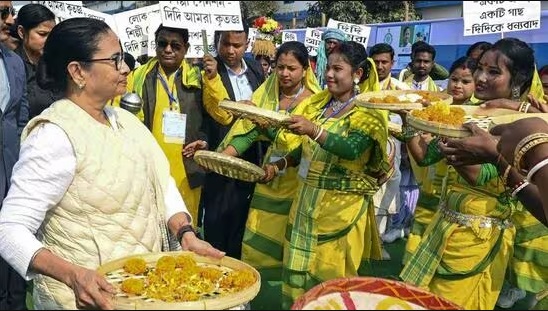
Mamata accuses the revival of CAA for political gain, alleges BSF distributing counterfeit cards
Hours later, Union Minister Shantanu Thakur announced that the CAA would be enforced within a week.
On Monday, West Bengal Chief Minister Mamata Banerjee accused the Border Security Force (BSF) of distributing distinct identity cards to residents along the Bangladesh border. She urged them to refuse these documents, warning that their names might be removed from the National Register of Citizens (NRC).
Speaking at a gathering in Cooch Behar, Mamata Banerjee questioned, “Who has opposed the NRC?” She also mentioned that the Citizenship (Amendment) Act or CAA issue was being revived for electoral purposes.
Shortly after Union minister Shantanu Thakur announced that the CAA would be enforced within a week, his statement emerged. Thakur, representing the Matua community, was among the 18 BJP Lok Sabha members elected from West Bengal in 2019.
The Matua community’s backing is perceived to have facilitated the BJP’s growth in West Bengal. It is anticipated that the community will reap the greatest rewards from the implementation of the CAA. Originating from the Dalit Namasudra group, which migrated from East Pakistan (now Bangladesh) during the partition in 1947 and the 1971 India-Pakistan war, the Matuas constitute a significant portion of voters in the northern and southern districts of Bengal bordering Bangladesh.
The CAA, passed in 2019, aims to expedite citizenship for non-Muslims arriving from Afghanistan, Pakistan, and Bangladesh before December 31, 2014. In Assam, a prior initiative detected around two million undocumented immigrants, leading to their exclusion from the NRC.
The CAA sparked protests due to concerns about discrimination and its linkage of faith with citizenship in a secular nation, excluding Muslims.
Despite repeated extensions, the Union government has yet to finalize rules for the CAA. Once implemented, eligible individuals can apply for Indian citizenship.

The ruling TMC opposes the CAA, denouncing it as “divisive”. Banerjee has consistently stated that the CAA will not be enforced in West Bengal.
Last month, Union Home Minister Amit Shah reiterated the inevitability of implementing the CAA, a significant electoral issue for the BJP in West Bengal, while accusing Banerjee of misleading the public.
Addressing her audience in Cooch Behar, Banerjee affirmed their Indian citizenship status, highlighting the issuance of land deeds to refugee colonies. She urged people to report instances of BSF harassment and advised against accepting separate identity cards issued by the BSF. Banerjee cautioned that accepting such cards could lead to exclusion from the NRC due to duplicity. Currently on a five-day district visit, she emphasized the importance of existing Aadhaar and ration cards.
Ahead of the 2021 assembly elections, the TMC lodged a complaint with the Election Commission of India, alleging that the BSF was intimidating villagers. The BSF refuted these allegations.
Additionally, the TMC opposed the proposed extension of the BSF’s jurisdiction from 15 km to 50 km along the border. Banerjee raised this concern during her meeting with Prime Minister Narendra Modi in October 2021. The BSF has not yet responded to Banerjee’s recent comments in Cooch Behar.
Samik Bhattacharya, a BJP spokesperson, criticized Banerjee, likening her statements to those of a separatist. He warned that her remarks could embolden anti-India forces.


